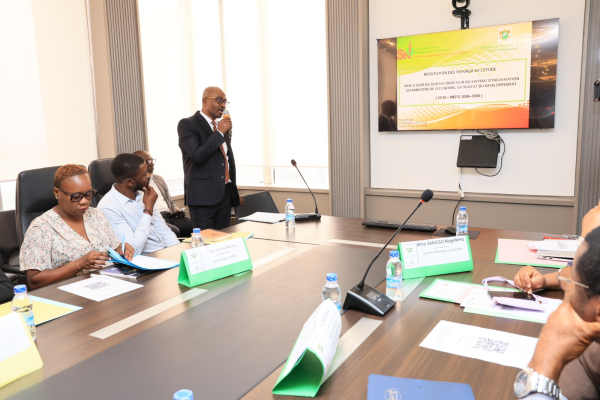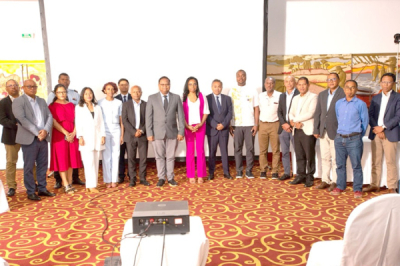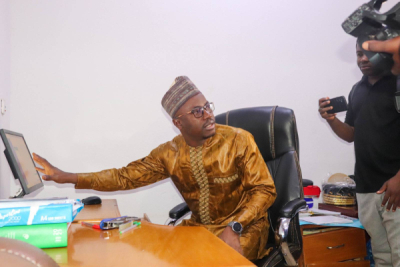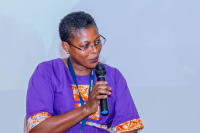- Côte d’Ivoire’s Economy Ministry adopted a 2026–2030 IT master plan to modernize public administration systems.
- The plan allocates CFA10.156 billion ($18 million) across 44 projects and six programs.
- The strategy aligns with a broader national digital push backed by a 37% budget increase for digital transition in 2026.
The Ministry of Economy, Planning and Development adopted the 2026–2030 Information System Master Plan. The strategic framework aims to modernize digital tools, strengthen data security, and optimize public service management. Officials presented the document during an official ceremony in Abidjan.
“The Master Plan now constitutes a strategic tool to strengthen digital governance and improve public action efficiency. This presentation, which brought together around forty participants, opens the way for the implementation of planned actions to provide the Ministry with a more modern, secure, and high-performing digital environment,” said Yéo Nahoua, Chief of Staff to Economy Minister Kaba Nialé.
The National Information Technology Development Company conducted an in-depth diagnostic review to support the update. The assessment identified structural gaps, including weak IT governance, multiple non-interconnected platforms, aging infrastructure, and insufficient security mechanisms.
To address these challenges, the plan relies on four key orientations. The strategy targets IT function professionalization, integrated network deployment, rollout of shared and secure applications, and modernization of technical infrastructure. The plan includes six programs and 44 concrete projects. The framework allocates a total budget of CFA10.156 billion, equivalent to about $18 million.
The initiative aligns with national priorities that position digital technology as a development driver. For 2026, the Ministry of Digital Transition and Digitalization secured a budget exceeding CFA83.2 billion. The allocation represents an increase of about 37% compared with 2025. The funding aims to improve digital performance and nationwide connectivity access.
These allocations add to prior investments that delivered tangible results in 2024. Authorities deployed more than 33,000 kilometers of fiber-optic infrastructure. The government launched digital administrative service platforms. The state expanded 4G coverage across multiple rural areas.
The implementation of the new master plan should support more structured digital governance and stronger system interconnection. The framework should also accelerate public service digitalization. The reforms should reduce processing costs and timelines. The upgrades should strengthen infrastructure resilience against cyber threats.
This article was initially published in French by Samira Njoya
Adapted in English by Ange Jason Quenum
- Hazem Afify founded Sumet in 2021 to modernize FMCG supply chains for African retailers.
- Sumet targets local and informal markets that traditional distribution networks serve inefficiently.
- The platform enables rapid deliveries, sometimes within 24 hours in major urban areas.
Hazem Afify is an Egyptian-born entrepreneur based in Dar es Salaam, Tanzania. He founded and currently leads Sumet as chief executive officer. The technology company redesigns fast-moving consumer goods supply chains for neighborhood retail stores.
Sumet launched operations in 2021. The company positions itself as a dedicated platform for fast-moving consumer goods. The platform aims to facilitate market entry and brand growth across Africa. The company focuses on local and often informal markets, where traditional distribution networks struggle to serve small retailers efficiently.
The platform allows merchants to order a wide range of branded products with a few clicks. The system provides fast delivery, sometimes within 24 hours in selected urban areas. This model reduces travel time, lowers logistics costs, and limits stock-out risks.
For brands and distributors, Sumet provides detailed visibility into product performance at individual retail outlets. The platform enables order tracking and merchandise flow monitoring. These features allow manufacturers to optimize delivery planning, adjust field presence, and better understand retailers’ operational needs.
Alongside Sumet, Hazem Afify co-founded and leads Global Business as chief executive officer. The export, import, and distribution company operates from Turkey. The company launched in 2015. It focuses primarily on fast-moving consumer goods and cosmetics. The company maintains branches in Tanzania, including Dar es Salaam and Zanzibar.
Hazem Afify graduated from Cairo University in Egypt. He earned a bachelor’s degree in electronic and communications engineering in 2007. He began his professional career in 2008 at Mentor Graphics. The electronic design automation company employed him as a technical marketing engineer and later as an integrated circuit design consultant until 2015.
This article was initially published in French by Melchior Koba
Adapted in English by Ange Jason Quenum
- Vuba Vuba launched in 2020 to fill the gap left by Jumia Food’s exit from Rwanda in 2019.
- The app connects users to restaurants, supermarkets, and local merchants with deliveries in under an hour.
- The platform has surpassed 100,000 downloads on Android and relies on motorcycle-based local logistics.
Vuba Vuba is a mobile application developed by a Rwandan startup. Albert Munyabugingo launched the platform in 2020. The application connects users to a wide range of restaurants, supermarkets, and merchants. The service offers fast deliveries, often in less than one hour.
The application operates on iOS and Android platforms. Google Play Store data show more than 100,000 downloads. The company relies on a strong local logistics network. The platform uses motorcycle couriers to distribute orders efficiently.
Beyond delivery services, Vuba Vuba creates economic opportunities for local stakeholders. The platform allows food outlets and small retailers to digitize sales channels. The solution helps merchants expand customer reach and increase order volumes without heavy investment in proprietary digital infrastructure.
The application integrates a tracking system that alerts customers when couriers collect orders. The system allows users to follow deliveries in real time and receive notifications when couriers approach. “Our team works diligently to ensure fast processing and delivery of orders. The estimated delivery time depends on your location. In general, you can expect your order to arrive within 45 minutes,” the startup said.
As e-commerce and digital services continue to expand across East Africa, Vuba Vuba demonstrates how locally adapted solutions can drive digital inclusion. The model supports entrepreneurship and responds to rising demand for efficient delivery services.
This article was initially published in French by Adoni Conrad Quenum
Adapted in English by Ange Jason Quenum
- Madagascar launched the process to draft its national cybersecurity strategy.
- Authorities aim to finalize the framework within three months.
- The strategy will update a cybersecurity law adopted in 2014.
Madagascar continues to structure its digital ecosystem after creating a national cybersecurity body in 2023. Authorities now focus on establishing a legal and strategic framework to protect systems and data amid rising cybercrime.
The Malagasy government formally launched the process to develop its national cybersecurity strategy last week following a kickoff workshop held in Antananarivo.
The event brought together public authorities, digital experts and technical partners. Officials presented the initiative as a key step toward securing the country’s digital space as digital usage expands across public administration, financial services and the broader economy.
“The stakeholders committed to finalizing this national cybersecurity strategy within three months,” said Eric Nirina Rakotomaniraka, head of the digital incident response team at the Computer Incident Response Team (CIRT).
He said the strategy will address key areas, including online child protection, combating gender-based cyber violence, digital justice, and international cooperation in cases of cyberattacks or data breaches.
On an operational level, the future strategy aims to structure cyber incident prevention, detection and response.
The document plans to strengthen national digital forensic capabilities, improve coordination between public institutions and private-sector actors, and support local skills development. Authorities also intend to use the strategy as a foundation to update the regulatory framework, as the 2014 cybersecurity law increasingly fails to reflect evolving technologies and threats.
The initiative comes as digital usage expands but information systems remain fragile. According to the Digital 2025 report, Madagascar counted approximately 6.6 million internet users in 2025, representing just over 20% of the population, a level that remains modest but continues to rise steadily.
At the same time, Madagascar faces limited cybersecurity capacity. The International Telecommunication Union’s Global Cybersecurity Index 2024 ranks the country in Tier 4 out of five.
This classification reflects significant gaps, particularly in technical infrastructure, institutional coordination, skills development and international cooperation.
Authorities expect the national cybersecurity strategy to strengthen protection of digital infrastructure, increase citizen and investor confidence in digital services, and support Madagascar’s broader digital transformation.
By laying the foundations for stronger digital sovereignty, the government aims to create a safer environment for innovation, online public services and the country’s integration into regional and global digital ecosystems.
This article was initially published in French by Samira Njoya
Adapted in English by Ange Jason Quenum
- Kevin Kissi founded Zof AI to reduce software incidents by up to 95%
- The platform uses AI agents to verify every code change before production
- Zof AI targets faster software delivery with up to tenfold productivity gains
Artificial intelligence continues to transform software engineering practices. In this context, new approaches increasingly focus on anticipating failures rather than reacting to incidents after deployment.
Ghanaian engineer and entrepreneur Kevin Kissi, who is based in the United States, has repositioned incident anticipation at the core of software development. He founded and currently leads Zof AI as Chief Executive Officer.
Founded in 2024, Zof AI provides a platform designed to help software teams deliver products faster while sharply reducing user-facing outages and incidents.
The platform deploys intelligent agents that understand the overall behavior of software systems and verify each change before production release. Zof AI aims to help teams deliver software up to ten times faster while cutting customer-impacting incidents by 95%.
Zof AI begins by building a detailed representation of an application’s architecture. The platform integrates codebases, services and interfaces into a unified system view.
This global model enables AI agents to identify system vulnerabilities and assess the potential impact of changes introduced by engineering teams.
Zof AI integrates directly with existing software development and deployment tools without requiring complex configuration.
Once connected, the solution becomes operational within a few days and analyzes changes before publication. The platform primarily targets engineering leadership, quality managers, and reliability and operations teams.
Kevin Kissi launched his first company in 2015. The startup, Auragh AI, developed a machine learning platform designed to improve human interaction with the physical world.
In 2016, Kissi founded Kissi & Co., a technology consulting firm. He led the company until 2024.
Kissi holds degrees in mechanical engineering and economics, as well as mathematics with a minor in computer science. He earned these qualifications at North Dakota State University in the United States.
In 2014, Kissi worked as a support engineer at Microsoft. Between 2016 and 2021, he held software engineering roles at Blueprint IT Solutions, Wanzek Construction, Boston Scientific, and U.S. Bank.
From 2021 to 2023, he served as Principal Software Engineering Manager at Microsoft.
This article was initially published in French by Melchior Koba
Adapted in English by Ange Jason Quenum
- Digital justice platforms generated more than CFA337 million ($603,700) for the state budget
- Online criminal records accounted for over 90% of applications and revenues
- Authorities launched new digital justice platforms in December to expand reforms
Burkina Faso continues to accelerate the digitalisation of public services to simplify administrative procedures for citizens. Authorities also aim to strengthen state revenues through this transformation.
The gradual digitisation of judicial services has started to generate tangible results. Over two years of operation, online platforms dedicated to nationality certificates and digital criminal records mobilised more than CFA337 million, equivalent to about $603,700, for the state budget.
The Ministry of Justice highlighted these results on Friday, December 12, during a site visit organised in Ouagadougou for the media. The initiative aimed to demonstrate the concrete impact of digital tools designed to modernise judicial document delivery and improve access to public services.
Authorities framed the reform within a national context marked by security constraints and significant geographic disparities.
As of December 11, 2025, the online nationality certificate platform recorded nearly 49,000 applications, generating just over CFA24 million in revenue.
However, the central digital criminal record platform captured most of the activity. The system processed more than 418,000 applications and generated over CFA312 million in revenue.
These volumes reflect rapid user adoption driven by simplified procedures and shorter processing times.
Beyond revenue generation, the platforms address a critical accessibility challenge. The systems allow citizens, including those living in insecure areas or remote regions, to obtain official documents remotely.
The platforms secure issued documents with QR codes, which strengthen authenticity and reduce fraud risks historically associated with paper-based procedures.
The digitalisation process continues to face operational challenges. Authorities still record application rejections, mainly due to non-compliant documents, incomplete files, or attempted falsification.
Technical officials say these issues highlight the need to strengthen user support and public awareness of digital procedure requirements. However, teams confirm that compliant applications usually receive processing times of less than 48 business hours.
Building on these results, the Ministry of Justice continues to expand its digital service offering.
Authorities officially launched several new platforms on December 15 in Ouagadougou, including Justice pénale en ligne, e-Permis de communiquer, and e-RCCM (Online Trade and Movable Credit Register). These launches mark a new phase in the modernisation of Burkina Faso’s judicial and administrative services.
This article was initially published in French by Samira Njoya
Adapted in English by Ange Jason Quenum
-
Marie Chantal Kouacou founded African Women Innovation 3.0 to train African women in AI, blockchain and Web3
-
The platform targets digital skills gaps that limit female entrepreneurship and leadership
-
AWI 3.0 combines online training, entrepreneurship programs and professional networking
Rapid digital transformation continues to reshape entrepreneurship and leadership models across Africa. However, unequal access to digital tools and skills continues to widen gender gaps. In this context, targeted initiatives increasingly focus on women’s digital empowerment.
Ivorian finance expert and entrepreneur Marie Chantal Kouacou promotes blockchain and Web3 adoption across Africa. She founded and currently leads African Women Innovation 3.0 (AWI 3.0) as Chief Executive Officer.
Founded in 2023, AWI 3.0 supports African women in acquiring high-demand technology skills. The organization delivers training in artificial intelligence, blockchain, Web3, digital productivity and innovation.
AWI 3.0 operates an online learning platform that centralizes all training modules. The initiative aims to equip women with the skills required to achieve autonomy, professional credibility and visibility in the digital economy.
AWI 3.0 structures its programs around several complementary pillars. The organization offers foundational training, entrepreneurship and leadership programs, personal branding development, networking, and mastery of digital tools.
Each training path focuses on practical competencies, including team management, strategic positioning, professional relationship building, and leveraging digital tools as growth drivers.
Alongside her role at AWI 3.0, Marie Chantal Kouacou serves as a business partner at GUILD4AI, a global artificial intelligence network that brings together innovative companies, speakers, experts and educators.
She also acts as Chief Administrative and Financial Officer of OIA Anacarde Côte d’Ivoire, a platform that federates stakeholders across the country’s cashew value chain.
Kouacou holds a degree in accounting and finance from the Institut National Polytechnique Félix Houphouët-Boigny in Yamoussoukro. She also graduated from TECH Global University, a digital university, where she earned a master’s degree in business intelligence in 2024.
Kouacou began her professional career in 2003 at Société Générale, where she worked as an administrative assistant.
In 2004, she joined Côte d’Ivoire’s National Center for Agronomic Research. She successively held positions as accountant, head of administrative and financial services, and head of management control, before leaving the institution in 2023.
This article was initially published in French by Melchior Koba
Adapted in English by Ange Jason Quenum
African social entrepreneurs can now apply for the Ashoka Venture & Fellowship Program, which leads to Ashoka Fellow status. Selected participants receive a needs-based stipend, tailored support, pro bono services and access to a global network of peers, designed to help scale their solutions and increase their systemic impact.
Indian unified commerce platform Fynd is expanding into South Africa through a partnership with luxury retailer Surtee Group, which operates nearly 100 boutiques. The partnership aims to link physical stores and online sales through an integrated technology stack, including real-time inventory management, in-store ordering and shipping, as e-commerce continues to grow rapidly in the country.
Egyptian startup iVoiceUp, which provides AI-powered tools for managing ethics alerts and compliance cases, has raised fresh capital in a funding round led by venture capital firm A15. The company, which helps organisations detect fraud, harassment and other forms of misconduct at an early stage, said it now serves more than one million users and plans to expand further across Egypt, Saudi Arabia and the United Arab Emirates.
More...
- Orange Money Group and Visa signed a strategic partnership to expand access to online payments in Africa and the Middle East.
- The partnership integrates a virtual Visa card into Orange Money’s ecosystem via the Max it app.
- Orange Money operates more than 45 million active accounts across 17 African countries.
Online payments continue to expand rapidly in Africa, driven by the rise of mobile services and e-commerce. However, limited access to secure and interoperable digital payment tools still constrains financial inclusion for a large share of the population.
Orange Money Group and Visa announced on Friday, December 12, in Casablanca that they signed a strategic partnership to facilitate online payments and strengthen financial inclusion across Africa and the Middle East. The collaboration aims to broaden the use of digital financial services as e-commerce and cashless payments accelerate across the region.
Speaking at the announcement, Orange Money Group Chief Executive Officer Thierry Millet said the partnership marks a key milestone in the group’s strategy. “From now on, individuals and entrepreneurs can create their virtual Visa card in seconds and pay online internationally across the entire Visa network. This first step in our strategic partnership brings Orange Money closer to a clear objective: becoming a payment method accepted everywhere, from major e-commerce platforms to local merchants,” he said.
Operationally, the partnership centers on integrating a Visa virtual card directly into the Orange Money ecosystem through the Max it application. Users can generate their card in a few clicks, fund it from their mobile wallet and pay for online purchases on local and international websites. Orange Money initially rolled out the solution in pilot markets such as Botswana, Madagascar and Jordan. The company has since introduced the service in Côte d’Ivoire and plans to expand it to additional countries, including Guinea, Burkina Faso and the Democratic Republic of Congo. Orange Money also plans to launch a physical version of the card to support broader use cases.
The initiative comes as Africa consolidates its position as a global engine of mobile money growth. According to GSMA data, the continent recorded more than one billion registered mobile money accounts in 2024 and accounted for over 70% of global mobile money transactions. At the same time, e-commerce continues to grow, supported by rising internet and smartphone penetration, although limited access to international online payment methods still restrains adoption. By combining Visa’s global acceptance network with Orange Money’s strong local footprint, the partnership aims to address this structural gap.
By leveraging Orange Money’s local presence — with more than 45 million active accounts across 17 African countries — and Visa’s international acceptance network, the partnership could help narrow the digital payments divide. Over time, it aims to integrate millions of users and small businesses into the digital economy by providing payment tools aligned with the requirements of online commerce while reinforcing financial inclusion across the continent.
Samira Njoya
- Yohann Behi founded Blok in 2023 to secure construction-material supply and delivery across African markets.
- Blok operates as a marketplace serving hardware retailers and construction firms with negotiated prices and scheduled delivery.
- Behi also leads IODCI West Africa, a regional construction-material trading and distribution company.
Yohann Behi tackles logistics inefficiencies in Africa’s construction sector by deploying a technology-driven approach designed to secure material supply. His initiative targets a central challenge for African construction sites: the reliability of delivery timelines and material flows.
Yohann Behi is an Ivorian entrepreneur and serves as chief executive officer of Blok, a construction-material procurement marketplace built for African industry players. He co-founded the platform in 2023 with Waly K. N’Diaye, who serves as chief operating officer.
Blok positions itself as a solution for ordering and delivering construction materials that allows hardware retailers and builders to receive supplies on time without logistical disruptions. The platform aggregates a wide range of products and enables hardware store owners to source materials from a single interface at prices the company presents as competitive relative to the market.
The solution also targets construction firms, for which precise delivery windows determine project execution. Blok delivers materials either directly to hardware stores or to construction sites, depending on client needs.
The start-up said most listed products benefit from negotiated pricing that undercuts prevailing market rates. Clients can settle payments in cash upon delivery or through mobile money platforms, including Wave, Orange Money and MTN Money.
Alongside his role at Blok, Yohann Behi serves as chief executive officer of IODCI West Africa, an Ivorian-owned company that specializes in construction-material trading across West Africa and in the distribution of paints and coatings. The company operates franchises in Abidjan and in Cotonou, Benin.
On the academic front, Behi graduated from the École internationale du management responsable 3A in Lyon. He earned a master’s degree in climate change and sustainable trade in 2010 and later obtained a master’s degree in international trade and project management from ISC Paris in 2012.
He launched his professional career in 2010 at Virtual Expo, a French start-up that supports business-to-business project developers, where he worked as a marketing project assistant. In 2012, he joined Bolloré Africa Logistics as account manager for West Africa.
In 2013, he joined PPG, the paints and coatings group, where he held successive roles as business developer, head of commercial sales and exports for West Africa, and key accounts and specifications manager. Between 2020 and 2023, he served as commercial director for sub-Saharan Africa at AGC Glass Europe, a company specializing in the production, processing and distribution of flat glass for the construction sector.
This article was initially published in French by Melchior Koba
Adapted in English by Ange Jason Quenum
- Moussa Nassakou founded Oneigo in 2023 to deliver digital, AI and smart-device solutions across West Africa.
- Oneigo develops payment, artificial intelligence and connected-device products, including MvoPay and Oneigo Alfa.
- Nassakou also leads initiatives in digital skills training, agri-tech and women’s inclusion in technology.
Moussa Nassakou advances digital transformation in West Africa through technology initiatives designed to address practical needs. His work aims to structure an innovation ecosystem that combines digital usage, skills development and entrepreneurial capacity.
Moussa Nassakou is a Togolese graphic designer, web developer, designer and technology entrepreneur. He serves as founder and chief executive officer of Oneigo, a company that specializes in research and development of digital and technological solutions.
Founded in 2023, Oneigo supports organizations in their digital transformation strategies. The company designs and integrates solutions ranging from connected security systems to smart management of residential and professional spaces. It also distributes intelligent home-automation equipment for monitoring, control and optimization of domestic and work environments, with a strong focus on ease of use for end users.
Beyond hardware solutions, Oneigo provides digital transformation consulting services and develops customized digital products. The company also deploys digital skills-building programs, notably through the OneDigital initiative, which aims to train young people for careers in the digital economy.
Among Oneigo’s flagship solutions, MvoPay operates as an all-in-one payment platform that enables transactions through QR codes. The company also developed Oneigo Alfa, an artificial-intelligence-based virtual assistant, as well as Oneigo Watch, a connected smartwatch focused on wellness monitoring and preventive health.
Alongside his entrepreneurial activities, Moussa Nassakou serves as director of the Africa Women Tech Festival, an organization that promotes women’s participation in Africa’s technology ecosystem by encouraging inclusion, innovation and female leadership. He also works as a digital transformation consultant at NunyaLab, an innovation support structure and creative hub.
He also serves as chief executive officer of Storads, an agri-tech start-up he founded in 2017. Through the use of drones equipped with advanced imaging capabilities and an e-commerce platform, the company enables Togolese farmers to improve yields, reduce costs and accelerate market access for their products.
Melchior Koba
The Orange Corners Innovation Fund (OCIF) has opened applications for its GROW programme, targeting South African startups. The fund offers hybrid financing split evenly between a grant and an interest-free loan, with amounts ranging from $12,000 to $59,000. The loan is repayable over 18 months and is followed by support to help startups prepare for further financing and investment. Applications close on Dec. 31.















